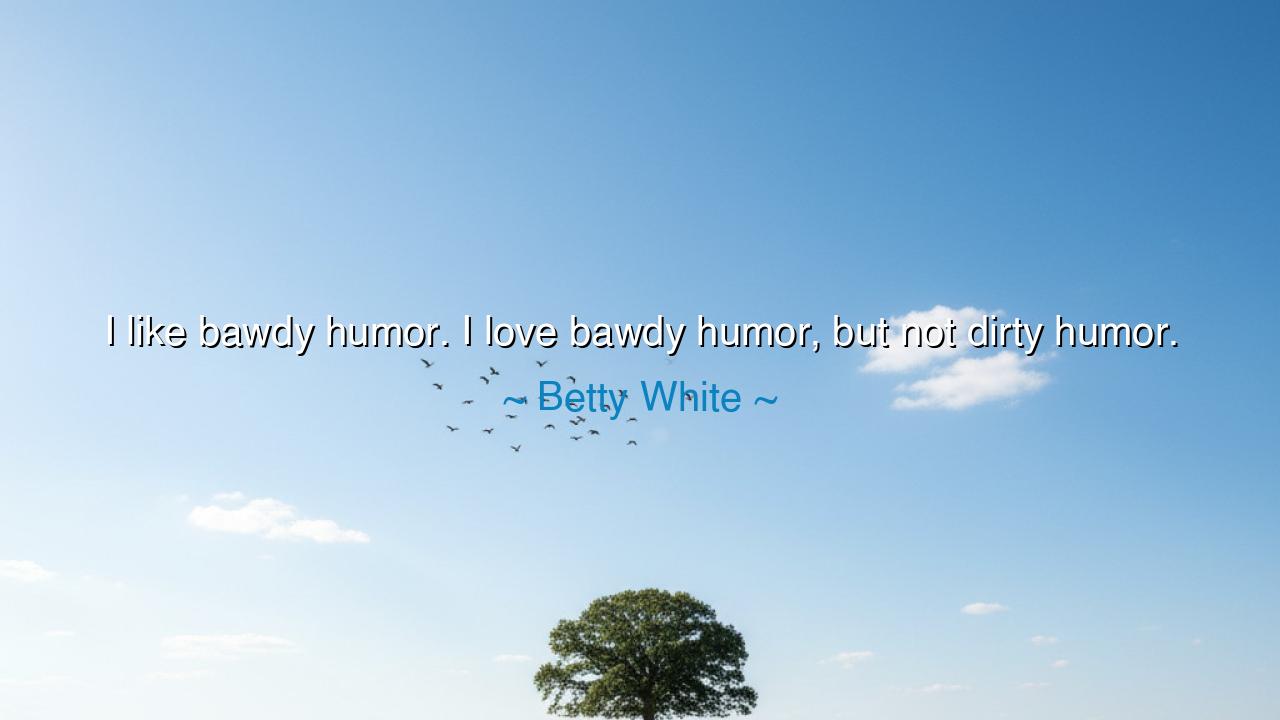
I like bawdy humor. I love bawdy humor, but not dirty humor.






In the words of the golden-hearted sage of laughter, Betty White, we hear a truth as subtle as it is profound: “I like bawdy humor. I love bawdy humor, but not dirty humor.” To the careless ear, these words may sound playful or trivial, yet to the wise, they reveal a deep understanding of joy, wit, and the dignity of the human spirit. For bawdy humor, when spoken with grace, celebrates the imperfections of life and the warmth of shared laughter; but dirty humor, born of cruelty or vulgarity, diminishes the soul. Betty White, in her long and radiant life, showed us that laughter is sacred—it may sparkle with mischief, but it must never poison the heart.
In ancient times, the philosophers and dramatists of Greece understood this delicate balance. Aristophanes, the comic poet, filled his plays with bawdy jokes and bold satire, yet beneath the laughter flowed wisdom about society, vanity, and the folly of men. His humor was like wine—strong, intoxicating, yet cleansing to the spirit. He jested not to degrade, but to awaken, not to offend, but to free the tongue from fear. This is the very essence of bawdy humor—that it speaks to the body’s truths without wounding the dignity of the soul. Betty White, though a woman of the modern world, stood in that same ancient lineage. She knew that laughter, when used rightly, is an art that binds us together in humanity.
To say “I love bawdy humor, but not dirty humor” is to draw a sacred boundary between honest joy and cheap ridicule. The former rejoices in the shared absurdity of life; the latter mocks it. One springs from love, the other from contempt. Betty White’s laughter was like sunlight—it revealed everything but scorched nothing. Even in her nineties, she joked with youthful boldness, never ashamed of life’s silliness, never afraid to speak of the body or desire. Yet her humor carried no sting, no malice, no vulgar shadow. In her way, she reminded us that one can be bold without being base, and that the truest comedy springs from affection, not anger.
There is a story told of Queen Elizabeth I, who, though surrounded by formality and courtly restraint, often delighted in the jesters who dared make her laugh. Once, a fool made a bawdy remark that skirted the edge of propriety. The courtiers gasped, fearing her wrath—but the queen laughed heartily, for the joke revealed not indecency but clever truth. “Better a jest that makes me wiser,” she said, “than a flattery that dulls my mind.” This story, like Betty White’s quote, reminds us that humor, when artful and alive, has the power to bridge status, age, and fear. It is the music of equality—the laughter of one human being recognizing another.
In every age, societies have wrestled with this balance between innocent mirth and vulgar mockery. When humor forgets compassion, it becomes weaponry; when it remembers love, it becomes medicine. Betty White’s long career was proof of the latter. She made millions laugh not by shocking them, but by inviting them to see the ridiculous and the tender in themselves. Her humor did not drag people into darkness—it lifted them toward the light of shared imperfection. That is the secret of bawdy humor: it honors the body and spirit together, never setting one against the other.
The deeper meaning of Betty White’s words lies in this: that laughter is a moral act. To make others laugh is to touch their hearts, and that is sacred ground. The difference between bawdy and dirty humor is the difference between playfulness and corruption. One springs from joy, the other from bitterness. One celebrates the beauty of life; the other mocks it. Therefore, she teaches us to guard our humor with reverence—to let it be mischievous, yes, but also kind; fearless, but never cruel.
So let this be your lesson: laugh freely, but laugh with love. Speak jokes that heal, not harm. Celebrate life’s foolishness without degrading its mystery. The next time you jest, ask yourself—does my humor unite or divide? Does it build warmth or cast shadows? Be like Betty White: let your laughter be bold enough to startle, but pure enough to bless. For laughter that honors the heart is divine—it is the music of wisdom wearing the mask of joy, the eternal reminder that to laugh without cruelty is to live with grace.






AAdministratorAdministrator
Welcome, honored guests. Please leave a comment, we will respond soon